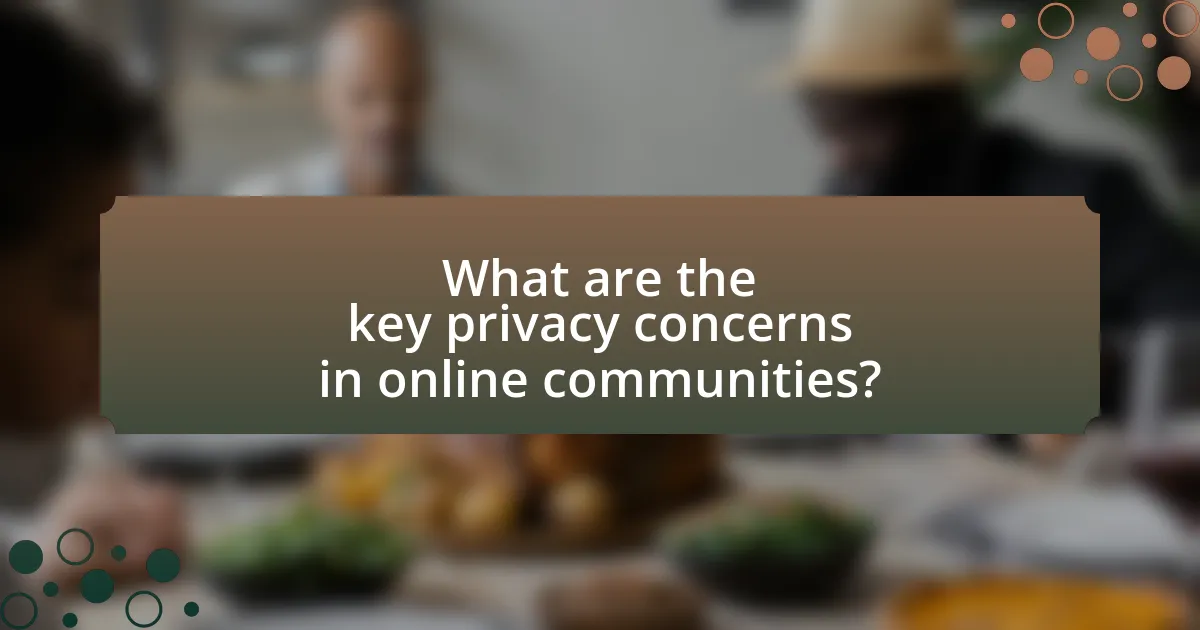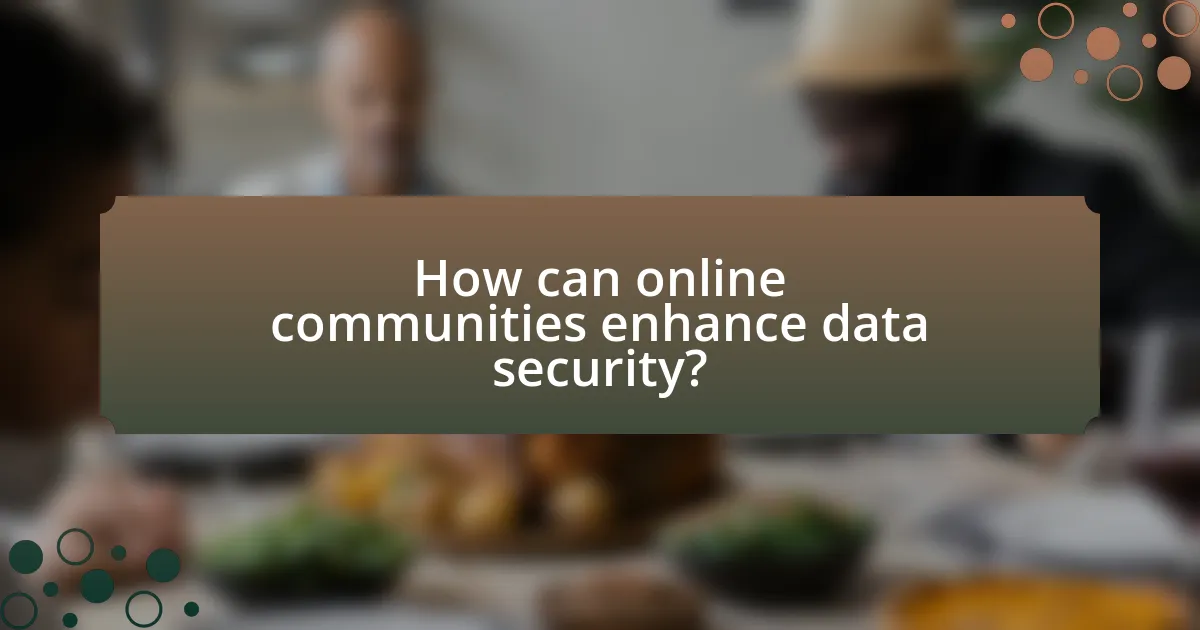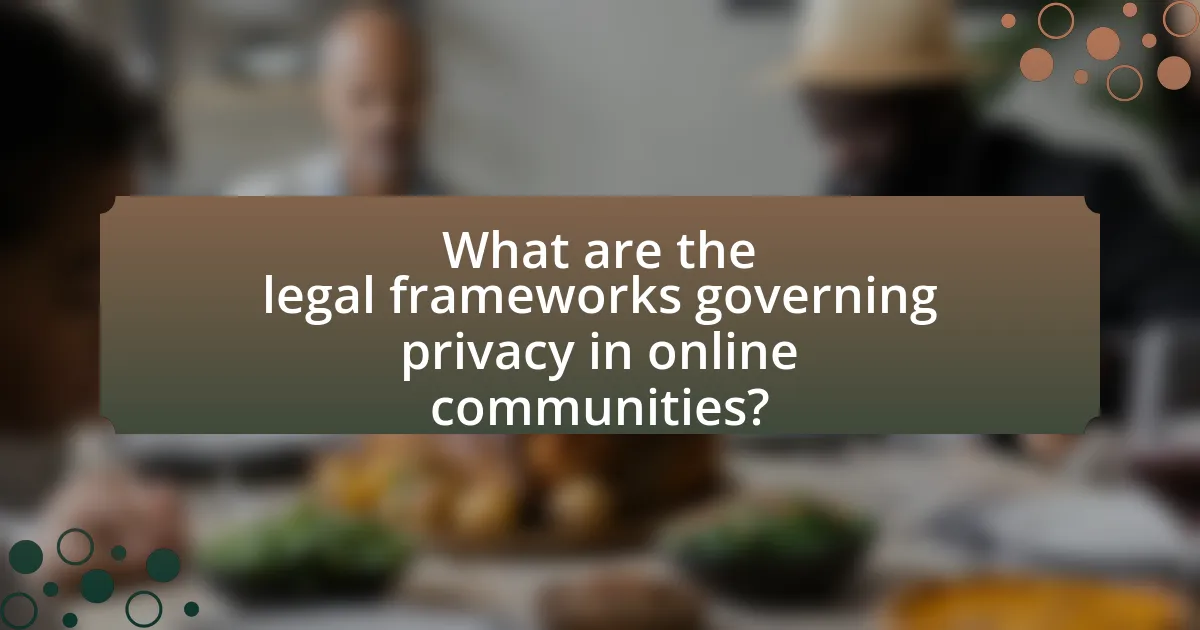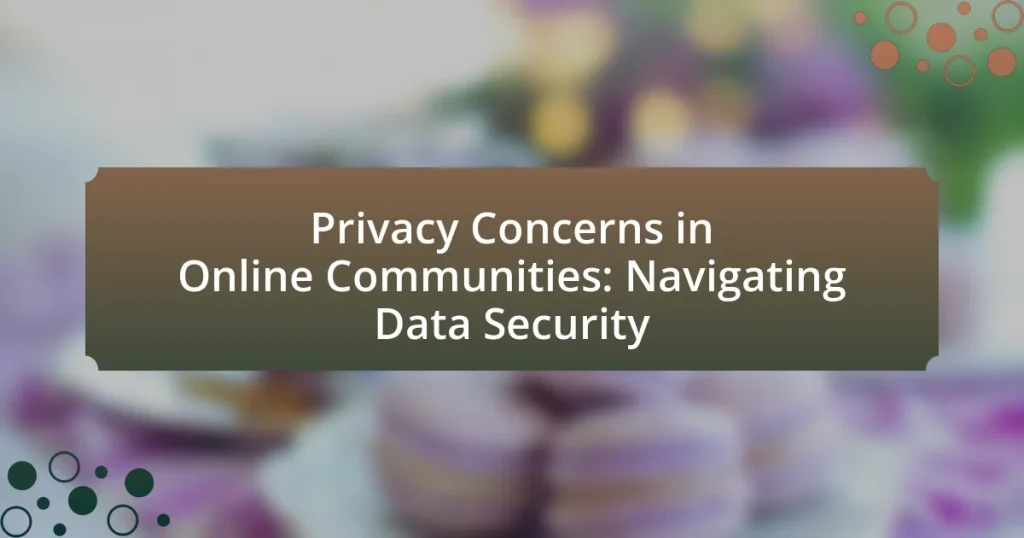The article focuses on privacy concerns in online communities, emphasizing key issues such as data breaches, user tracking, and inadequate data protection measures. It highlights the impact of data breaches on user privacy, common causes of these breaches, and the importance of user consent in data practices. Additionally, the article discusses the role of encryption in safeguarding user data, the legal frameworks governing privacy, and practical steps users can take to enhance their privacy. By addressing these critical aspects, the article aims to provide a comprehensive understanding of the challenges and solutions related to data security in online environments.

What are the key privacy concerns in online communities?
Key privacy concerns in online communities include data breaches, user tracking, and inadequate data protection measures. Data breaches can expose personal information, as evidenced by incidents like the 2019 Facebook breach, where the personal data of over 540 million users was compromised. User tracking, often through cookies and third-party applications, raises issues of consent and transparency, with studies indicating that 79% of internet users express concern about how their data is being used. Inadequate data protection measures, such as weak encryption and poor access controls, further exacerbate these risks, leading to unauthorized access and misuse of sensitive information.
How do data breaches impact user privacy in online communities?
Data breaches significantly compromise user privacy in online communities by exposing personal information such as names, email addresses, and passwords. When these breaches occur, unauthorized individuals can access sensitive data, leading to identity theft, harassment, or targeted phishing attacks. For instance, the 2017 Equifax breach affected approximately 147 million people, revealing critical personal information and highlighting the vulnerability of user data in online platforms. Such incidents erode trust in online communities, as users become wary of sharing personal information, ultimately impacting community engagement and participation.
What are the common causes of data breaches in these environments?
Common causes of data breaches in online communities include weak passwords, inadequate encryption, and phishing attacks. Weak passwords often lead to unauthorized access, as many users fail to implement strong, unique passwords for their accounts. Inadequate encryption can expose sensitive data during transmission, making it vulnerable to interception. Phishing attacks trick users into revealing personal information, which can then be exploited by malicious actors. According to the 2021 Verizon Data Breach Investigations Report, 36% of data breaches involved stolen credentials, highlighting the critical role of password security in preventing breaches.
How can users identify if their data has been compromised?
Users can identify if their data has been compromised by monitoring for unusual account activity, receiving unexpected notifications, or noticing unauthorized transactions. For instance, if a user receives alerts about password changes or login attempts from unfamiliar locations, it may indicate a breach. Additionally, users should regularly check their financial statements for unauthorized charges, as studies show that 30% of data breaches involve financial fraud. Utilizing security tools like credit monitoring services can also help detect identity theft early, as these services alert users to changes in their credit reports.
Why is user consent important in online communities?
User consent is crucial in online communities because it ensures that individuals have control over their personal information and how it is used. This control fosters trust between users and the platform, which is essential for a healthy online environment. According to a study by the Pew Research Center, 79% of Americans express concern about how their data is being used by companies, highlighting the importance of transparency and consent in data practices. Furthermore, legal frameworks such as the General Data Protection Regulation (GDPR) mandate that organizations obtain explicit consent from users before processing their data, reinforcing the necessity of user consent in maintaining compliance and protecting user rights.
What are the implications of not obtaining user consent?
Not obtaining user consent can lead to significant legal and ethical implications for organizations. Legally, companies may face penalties under regulations such as the General Data Protection Regulation (GDPR), which mandates explicit consent for data processing; violations can result in fines up to 4% of annual global revenue. Ethically, failing to secure consent undermines user trust, potentially damaging the organization’s reputation and leading to loss of customer loyalty. Furthermore, without consent, organizations risk unauthorized data usage, which can result in data breaches and misuse of personal information, exacerbating privacy concerns in online communities.
How can communities ensure informed consent from users?
Communities can ensure informed consent from users by implementing clear and transparent communication regarding data collection and usage practices. This involves providing users with easily accessible information about what data is being collected, how it will be used, and the potential risks involved. For instance, according to the General Data Protection Regulation (GDPR), organizations must obtain explicit consent from users before processing their personal data, which emphasizes the necessity of clarity and user understanding in consent processes. Additionally, communities can utilize user-friendly consent forms that outline terms in straightforward language, ensuring that users can make informed decisions.
What role does data encryption play in protecting privacy?
Data encryption plays a crucial role in protecting privacy by converting sensitive information into a coded format that can only be accessed by authorized users. This process ensures that even if data is intercepted during transmission or accessed without permission, it remains unreadable and secure. For instance, encryption protocols like AES (Advanced Encryption Standard) are widely used to safeguard personal data, making it nearly impossible for unauthorized parties to decipher the information without the correct decryption key. According to a report by the Ponemon Institute, organizations that implement encryption can reduce the risk of data breaches significantly, highlighting its effectiveness in maintaining privacy in online communities.
How does encryption work to secure user data?
Encryption secures user data by converting it into a coded format that can only be read by authorized parties. This process involves algorithms that transform plaintext into ciphertext, making the data unreadable to anyone who does not possess the correct decryption key. For instance, the Advanced Encryption Standard (AES) is widely used and recognized for its effectiveness in protecting sensitive information, as it employs symmetric key encryption, where the same key is used for both encryption and decryption. This method ensures that even if data is intercepted during transmission, it remains secure and inaccessible without the key, thus safeguarding user privacy in online communities.
What are the limitations of encryption in online communities?
Encryption in online communities has several limitations, including the potential for misuse, the challenge of key management, and the inability to protect against all forms of cyber threats. Misuse occurs when individuals exploit encryption to engage in illegal activities, such as trafficking or harassment, making it difficult for law enforcement to intervene. Key management poses a challenge because if users lose their encryption keys, they may permanently lose access to their data. Furthermore, encryption does not safeguard against threats like phishing attacks or social engineering, where attackers manipulate users into revealing sensitive information. These limitations highlight that while encryption enhances data security, it is not a comprehensive solution for all privacy concerns in online communities.

How can online communities enhance data security?
Online communities can enhance data security by fostering collective vigilance and sharing best practices among members. These communities often facilitate discussions on emerging threats, enabling users to stay informed about potential vulnerabilities. For instance, platforms like Reddit and specialized forums allow users to report security breaches and share solutions, which can lead to quicker identification and mitigation of risks. Additionally, community-driven initiatives, such as open-source security tools, empower members to collaborate on developing robust security measures, thereby increasing overall resilience against cyber threats.
What best practices should online communities adopt for data security?
Online communities should adopt strong encryption methods for data security. Implementing end-to-end encryption ensures that user data is protected during transmission, making it inaccessible to unauthorized parties. Additionally, regular security audits and vulnerability assessments help identify and mitigate potential risks, as evidenced by a 2021 report from the Cybersecurity and Infrastructure Security Agency, which highlighted that proactive security measures significantly reduce the likelihood of data breaches. Furthermore, educating users about safe online practices, such as recognizing phishing attempts and using strong passwords, enhances overall community security.
How can regular security audits improve community safety?
Regular security audits can significantly improve community safety by identifying vulnerabilities and ensuring compliance with security protocols. These audits systematically assess the effectiveness of security measures, allowing communities to address weaknesses before they can be exploited. For instance, a study by the Ponemon Institute found that organizations conducting regular security audits experienced 50% fewer data breaches compared to those that did not. By proactively identifying risks and implementing necessary changes, communities can enhance their overall security posture, thereby fostering a safer environment for all members.
What training should community managers receive regarding data security?
Community managers should receive training on data protection regulations, secure data handling practices, and incident response protocols. This training should cover the General Data Protection Regulation (GDPR) and the California Consumer Privacy Act (CCPA), which outline legal obligations for data privacy. Additionally, community managers must learn about encryption methods, secure password management, and recognizing phishing attempts to protect sensitive information. According to a 2021 report by the Ponemon Institute, organizations that provide comprehensive data security training reduce the risk of data breaches by up to 70%. This evidence underscores the importance of equipping community managers with the necessary skills to safeguard user data effectively.
How can users protect their own privacy in online communities?
Users can protect their privacy in online communities by utilizing strong, unique passwords and enabling two-factor authentication. Strong passwords reduce the risk of unauthorized access, while two-factor authentication adds an additional layer of security, making it significantly harder for attackers to compromise accounts. According to a 2021 report by the Cybersecurity & Infrastructure Security Agency, accounts with two-factor authentication are 99.9% less likely to be hacked. Additionally, users should regularly review and adjust their privacy settings on platforms to limit data sharing and visibility. This proactive approach helps safeguard personal information from potential breaches and misuse.
What tools and settings can users utilize to enhance their privacy?
Users can utilize tools such as virtual private networks (VPNs), encrypted messaging apps, and privacy-focused web browsers to enhance their privacy. VPNs encrypt internet traffic, masking users’ IP addresses and preventing tracking by third parties. Encrypted messaging apps, like Signal and WhatsApp, ensure that communications are secure and only accessible to intended recipients. Privacy-focused web browsers, such as Brave and Firefox with privacy settings adjusted, block trackers and ads, further safeguarding user data. These tools collectively contribute to a more secure online experience by minimizing data exposure and enhancing anonymity.
How can users recognize and avoid phishing attempts?
Users can recognize and avoid phishing attempts by being vigilant about suspicious emails, messages, and websites. Phishing attempts often feature poor grammar, generic greetings, and urgent requests for personal information. Users should verify the sender’s email address, hover over links to check their destination, and avoid clicking on unexpected attachments. According to the Anti-Phishing Working Group, in 2021, 83% of phishing attacks were conducted via email, highlighting the importance of scrutinizing email communications. Additionally, employing security software and enabling two-factor authentication can further protect users from falling victim to these scams.

What are the legal frameworks governing privacy in online communities?
The legal frameworks governing privacy in online communities primarily include the General Data Protection Regulation (GDPR) in the European Union, the California Consumer Privacy Act (CCPA) in the United States, and various other national and international laws. The GDPR, effective since May 2018, mandates strict data protection and privacy measures for individuals within the EU, requiring organizations to obtain explicit consent for data processing and providing individuals with rights to access, rectify, and erase their personal data. The CCPA, enacted in 2018, grants California residents rights regarding their personal information, including the right to know what data is collected and the right to opt-out of its sale. These frameworks are designed to enhance user privacy and data security in online communities, reflecting a growing global emphasis on protecting personal information in digital environments.
How do regulations like GDPR affect online community practices?
Regulations like GDPR significantly impact online community practices by enforcing strict data protection and privacy standards. Online communities must implement measures to ensure user consent for data collection, limit data processing to necessary information, and provide users with rights to access, rectify, or delete their personal data. For instance, GDPR mandates that organizations must demonstrate compliance through documentation and regular audits, which can lead to increased operational costs and changes in community management strategies. Additionally, non-compliance can result in hefty fines, as seen in cases where companies faced penalties reaching millions of euros for data breaches or inadequate user consent practices.
What are the key requirements of GDPR for online communities?
The key requirements of GDPR for online communities include obtaining explicit consent from users for data processing, ensuring transparency about data collection and usage, allowing users to access and delete their personal data, and implementing appropriate security measures to protect user data. GDPR mandates that online communities must inform users about their rights regarding personal data, including the right to data portability and the right to withdraw consent at any time. Additionally, organizations must appoint a Data Protection Officer if they process large amounts of personal data or sensitive data. Compliance with these requirements is essential to avoid significant fines and legal repercussions, as non-compliance can result in penalties of up to 4% of annual global turnover or €20 million, whichever is higher.
How can communities ensure compliance with GDPR?
Communities can ensure compliance with GDPR by implementing robust data protection policies and practices. This includes appointing a Data Protection Officer (DPO) to oversee compliance efforts, conducting regular data audits to identify and mitigate risks, and ensuring that all members are trained on data privacy principles. Furthermore, communities should establish clear consent mechanisms for data collection and processing, maintain transparent privacy notices, and facilitate users’ rights to access, rectify, or delete their personal data. Evidence of effective GDPR compliance can be seen in organizations that have adopted these measures, resulting in reduced data breaches and enhanced trust among users.
What are the consequences of non-compliance with privacy laws?
Non-compliance with privacy laws can lead to significant legal and financial consequences for organizations. These consequences include hefty fines, which can reach millions of dollars depending on the severity of the violation and the specific regulations breached, such as the General Data Protection Regulation (GDPR) in Europe, which imposes fines up to 4% of annual global turnover or €20 million, whichever is higher. Additionally, organizations may face lawsuits from affected individuals, resulting in further financial liabilities and reputational damage. Non-compliance can also lead to increased scrutiny from regulatory bodies, potentially resulting in more stringent oversight and operational restrictions.
What penalties can online communities face for data breaches?
Online communities can face significant penalties for data breaches, including fines, legal action, and reputational damage. Regulatory bodies, such as the General Data Protection Regulation (GDPR) in the European Union, impose fines that can reach up to 4% of annual global revenue or €20 million, whichever is higher. Additionally, affected individuals may file lawsuits for damages, leading to further financial liabilities. The Federal Trade Commission (FTC) in the United States can also impose penalties for unfair or deceptive practices related to data security. These penalties underscore the importance of robust data protection measures within online communities to mitigate risks associated with data breaches.
How can communities mitigate risks associated with non-compliance?
Communities can mitigate risks associated with non-compliance by implementing robust data governance frameworks that include clear policies, regular training, and compliance audits. Establishing these frameworks ensures that community members understand their responsibilities regarding data privacy and security. For instance, organizations that adopt comprehensive training programs report a 50% reduction in compliance violations, as evidenced by a study from the International Association of Privacy Professionals. Regular audits further reinforce adherence to these policies, allowing communities to identify and rectify potential compliance gaps proactively.
What practical steps can users take to safeguard their privacy in online communities?
Users can safeguard their privacy in online communities by implementing strong privacy settings, using unique passwords, and being cautious about the information they share. Adjusting privacy settings on social media platforms allows users to control who can see their posts and personal information, thereby reducing exposure to unwanted attention. Utilizing unique passwords for different accounts minimizes the risk of unauthorized access, as a breach in one account will not compromise others. Additionally, users should avoid sharing sensitive personal information, such as their full name, address, or financial details, in public forums to protect themselves from identity theft and other privacy violations. These steps are supported by studies indicating that proactive privacy management significantly reduces the likelihood of data breaches and enhances user security in digital environments.
How can users create strong passwords and manage them effectively?
Users can create strong passwords by using a combination of upper and lower case letters, numbers, and special characters, ensuring that the password is at least 12 characters long. This complexity makes it significantly harder for attackers to guess or crack passwords; for instance, a password with 12 characters can have over 4 trillion possible combinations. To manage passwords effectively, users should utilize password managers, which securely store and encrypt passwords, allowing for unique passwords for each account without the need to remember them all. Research indicates that 81% of data breaches are due to weak or stolen passwords, highlighting the importance of strong password practices and management.
What are the benefits of using two-factor authentication in online communities?
Two-factor authentication (2FA) enhances security in online communities by requiring users to provide two forms of identification before accessing their accounts. This additional layer of security significantly reduces the risk of unauthorized access, as even if a password is compromised, the account remains protected by the second factor, typically a code sent to a mobile device or generated by an authentication app. According to a study by Google, implementing 2FA can block 99.9% of automated attacks, demonstrating its effectiveness in safeguarding user accounts against breaches.
